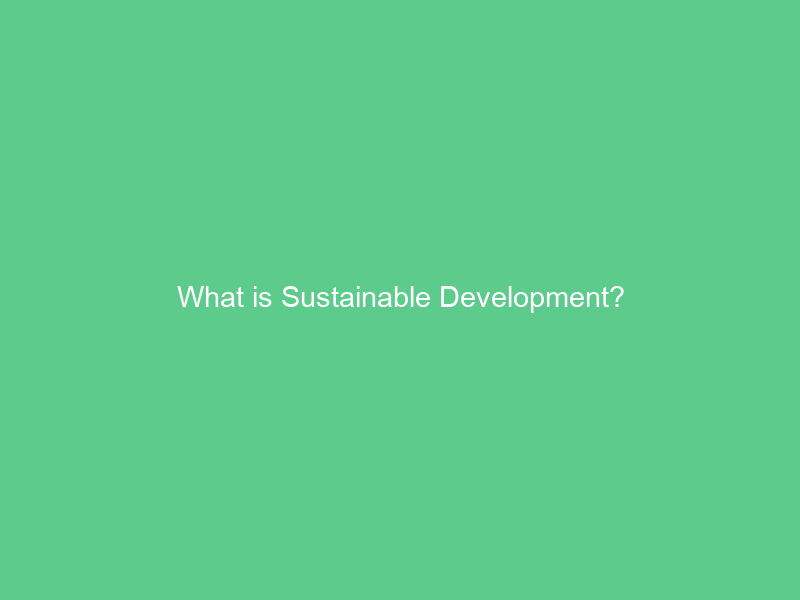Sustainable development refers to creating an equitable society while safeguarding the environment, such as by reducing emissions, pollutant reduction and protecting biodiversity.
Sustainability requires efforts from all duty-bearers. It entails sustainable consumption patterns and circular economies that promote poverty reduction and equality.
Ecological sustainability
Ecological sustainability refers to the capacity of ecosystems to function on an extended timescale, including maintaining access to clean water, soils free of pollutants, a comfortable climate and biodiversity preservation.
Environmentalism is an integral component of sustainable development, and has gained prominence since the release of Brundtland Report in 1987. Global concerns over nonrenewable natural resources and pollution risks have grown since then (Paxton 1993).
Ecological sustainability aims to reduce the negative effects of human activities on the environment. This involves recycling and composting waste, using energy-saving technologies, implementing sustainable procurement and manufacturing practices and adopting eco-friendly procurement. Reforestation efforts should also be encouraged along with reduction of carbon emissions. Companies should disclose environmental information in an organized fashion as part of this practice in order to comply with sustainability standards; penalties for damaging the environment must also be high enough as deterrents.
Economic sustainability
Economic sustainability involves long-term economic growth and development without jeopardizing future generations’ ability to meet their own needs. It forms the cornerstone of the Sustainable Development Goals and requires careful consideration of social, environmental and economic concerns.
Economic sustainability means protecting the natural environment, including biodiversity and ecosystems, by reducing air and water pollution as well as fighting deforestation. Furthermore, economic sustainability works to foster small business opportunities as well as encourage entrepreneurship; additionally it strives to alleviate poverty while assuring all people have adequate employment with fair incomes.
Economic sustainability can be difficult, yet an essential element of meeting sustainable development goals. Achieve it requires taking an integrated approach to business with environmental and social stewardship at its core; for instance, lifecycle analysis, supply chain transparency, green practices incentivizing programs, regenerative models adoption, diversification strategies etc. These steps will help companies reduce their environmental footprint while simultaneously increasing profits and competitiveness.
Social sustainability
Sustainable development encompasses more than ecological and economic sustainability alone; social sustainability plays an essential role. It aims to enhance quality of life by implementing policies that foster equality, diversity, and democracy; it seeks to protect workers’ rights and foster industrial innovation while developing cost-effective energy sources that are also sustainable.
One key component of social sustainability is improving people’s quality of life, such as providing them with affordable housing and healthcare services, while also encouraging progressive social traditions and customs that enhance employee morale and productivity. Companies may sometimes neglect this aspect of sustainability; however, doing so could significantly boost employee morale and enhance productivity. It’s also vital to make sure local communities have input into which products or services they receive which will increase transparency and trust, leading to further collaboration between business and community members and fostering more long-term collaboration that ultimately creates more sustainable future for both parties involved.
Political sustainability
Political sustainability encompasses policies designed to address inequality within and among nations. This goal seeks to ensure all individuals can access economic resources for living a healthy, environmental friendly life; additionally it involves protecting poor individuals against climate-related disasters while encouraging sustainable agricultural practices.
Political sustainability also encompasses protecting natural resources and biodiversity. Our planet only has limited natural resources, and increasing exploitation could threaten their availability in the future. Furthermore, overexploitation causes environmental degradation and pollution which threaten human health; sustainable development has raised global awareness that only so much population growth and industrialisation is sustainable for Earth’s resources.
Social movements promoting agro-ecology, food sovereignty, circular economies and transition towns are increasingly adopting the language of sustainable development to reclaim space for broad politics of transformation. But these movements should avoid perpetuating globalism with its narrow views of technical solutions as a central plank in their mission statements.

